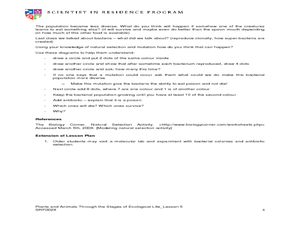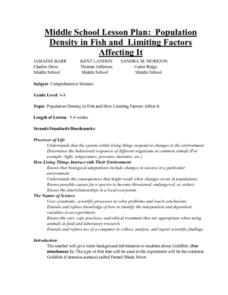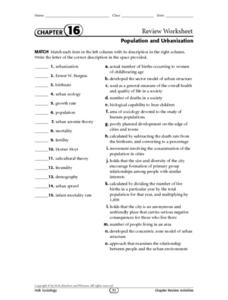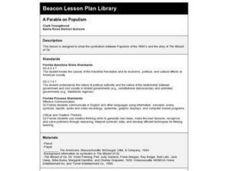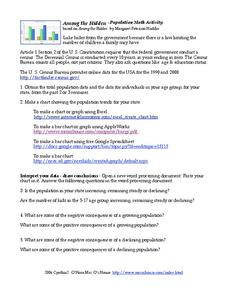Curated OER
Populations- The Survival of the Fittest
Students examine the ways that populations become diverse and how mutation changes the diversity of a population. In this exploratory activity students study natural selection by completing a lab activity and discussing what they...
Curated OER
Human Ecology: How it Relates to Population
Ninth graders are introduced to the concept of population. In groups, they research the problems associated with overpopulation and underpopulation. They practice calculating birth and death rates and discus how they can be used to...
Curated OER
Population Density In Fish
Students investigate how a population of fish multiplies in an ecosystem and the kinds of things that must be done to maintain a healthy population balance with other organisms that live there. They conduct an experiment to test the...
Curated OER
Population and Urbanization
In this population and urbanization worksheet, students match 15 terms with the appropriate descriptions and respond to 8 short answer questions regarding these sociological themes.
Curated OER
A Parable on Populism
Fourth graders study the sombolism between Populism of the 1890's and the story of The Wizard of Oz.
Curated OER
Human Population Ecology: Demography
Students describe the basic concepts of population demography. They collect a wide range of data from an online cemetery database including a variety of places across the U.S. They analyze factors that may have affected human demography...
Curated OER
Among the Hidden - Population Math Activity
In this population worksheet, students collect data on population by researching the Census Bureau and then make online graphs and answer short answer questions about the data. Students complete 5 problems total.
Curated OER
Brain Teaser - Population
In this logic worksheet, students solve a word problem using logic about the percentage of population of the French who speak English. Students complete 1 problem.
Curated OER
Normal Curve Areas - Population
In this normal curve areas worksheet, learners follow 6 steps to compute the probability regarding the values from the population. First, they label x-scale with the mean and corresponding standard deviations and shade the area(s) under...
Curated OER
Whoa! Slow Down-Some of You!
Students analyze demographic data (growth rate, natural increase, fertility rate, crude birth rates, and crude death rates) and determine which areas of the world contain the fastest and slowest growth rates. They construct population...
Curated OER
Size It Up: Map Skills
Compare information from a US population cartogram and a standard US map. Learners draw conclusions about population density by analyzing census data a population distribution. They discover that census data is used to apportion seats in...
Curated OER
Where is Everybody?
Students collect data from different grade levels at their school and develop thematic maps which show population density, and determine how this might affect the school and themselves in the future.
Curated OER
Race and Ethnicity in the United States
Students explore race and ethnicity as it is defined by the U. S. Census Bureau. They compare data from 1900, 1950, and 2000 and identify settlement patterns and changes in population. In groups, they map these changes and discuss...
Curated OER
Mountain Lions in Arizona Overview
Here is an overview to a unit on the mountain lions of Arizona. Six different lessons take youngsters on a complete investigation of the adaptations, diet, population density, and management of these beautiful wild cats. Each of the...
Curated OER
Go Fish
Help learners discover methods to estimate animal population. They will participate in a simulation of catching and tagging fish in order to estimate the fish population. They scoop and count goldfish crackers, record data, and use...
Curated OER
"Croak" Science Mystery
Solve the mystery of a declining frog population! Lead your junior ecologists on an investigation that simulates actual events concerning pollution, predation, poaching, and more. Investigators read a story online, then analyze survey...
Serendip
Understanding and Predicting Changes in Population Size – Exponential and Logistic Population Growth Models vs. Complex Reality
Salmonella poisoning impacts over 200,000 people in the United States each year. Scholars learn about the growth of these bacteria using multiple approaches. Then they apply the same growth calculations to endangered species and think...
EngageNY
Margin of Error When Estimating a Population Proportion (part 1)
Use the power of mathematics to find the number of red chips in a bag — it's a little like magic! The activity asks learners to collect data to determine the percentage of red chips in a bag. They calculate the margin of error and...
EngageNY
Margin of Error When Estimating a Population Mean (part 1)
We know that sample data varies — it's time to quantify that variability! After calculating a sample mean, pupils calculate the margin of error. They repeat the process with a greater number of sample means and compare the results.
EngageNY
Margin of Error When Estimating a Population Mean (part 2)
Don't leave your classes vulnerable in their calculations! Help them understand the importance of calculating a margin of error to represent the variability in their sample mean.
Radford University
Is it Really a Small World After All?
Working in groups, learners research four countries' populations over the past 30 years. Using the data collected, the teams find regression equations that best fit the data. Taking the regression equations, they then make predictions...
Shodor Education Foundation
Rabbits and Wolves
A change in a parameter can end in overpopulation. The resources gives pupils the opportunity to control the parameters of rabbits and wolves in a natural setting. Using the set parameters, the simulation runs and displays the population...
Council for Economic Education
The Neolithic Agricultural Revolution
What effect could one person's invention have on the human race? In the case of the Neolithic Agricultural Revolution, small improvements in farming methods led to increased food production. The human population began to boom, leading us...
Radford University
Feeding the World
Using technology, pupils find an exponential function to model the population growth of the US. With more information, learners derive the population growth formula for the world. Ultimately, they determine the amount of protein needed...
Other popular searches
- Population Ecology
- Population Genetics
- Population Density
- Population Biology
- Population Growth
- Population Geography
- Human Population
- World Population
- Population Distribution
- Aging Population
- Populations and Ecosystems
- Human Population Growth
